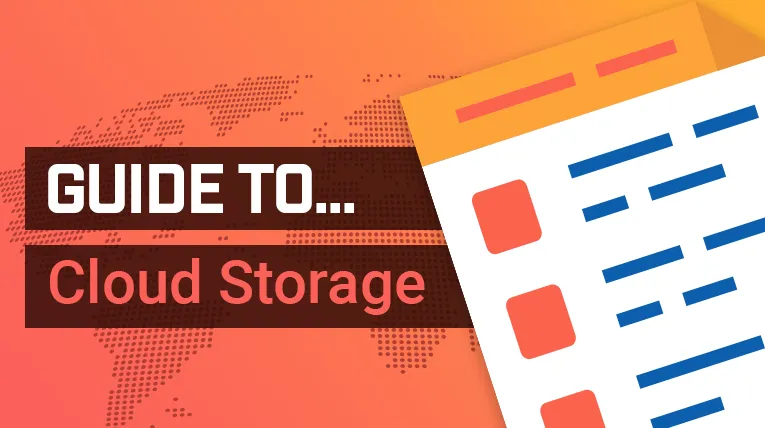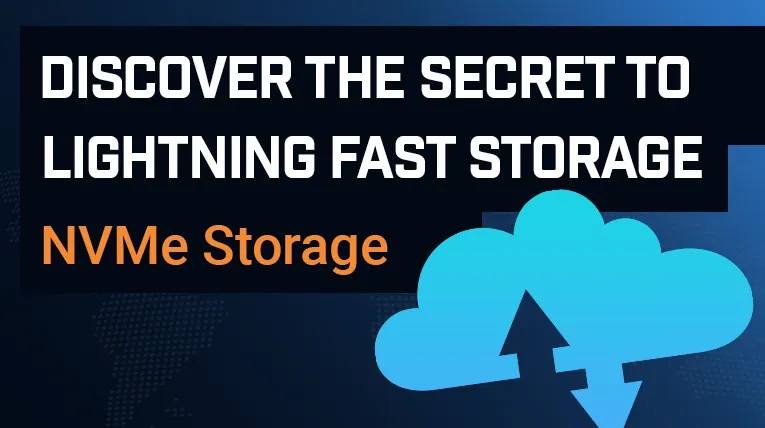The Guide to Cloud Storage
Last Updated: February 4th, 2025 11 min read Servers Australia

What is Cloud Storage?
Cloud Storage is a cloud computing model that allows you to store and save data to an off-site location that you can access through the internet.
Cloud storage is quickly becoming the go-to data storage model for businesses of all sizes. However, even after you’ve decided that cloud storage is the right solution for your business, you’ll still need to decide between the different types of cloud storage that are available.
To help make that decision a little easier, we’ll cover the three different types of cloud storage as well as the things you will want to consider when choosing which type is the best fit for you and your business.
How Does Cloud Storage Work?
Cloud storage is a way of saving data on remote servers rather than on your personal computer or an external hard drive. These servers are maintained by cloud providers in secure data centres. When you upload a file to cloud storage, it is sent over the internet to one of these servers, where it is stored safely until you need to access it again.
To understand this better, let’s break it down step by step:
Uploading Data – When you save a file to the cloud, your computer or mobile device sends the file over the internet to a remote data centre.
Storage and Redundancy – Your file is stored securely on a physical server, often with multiple copies spread across different locations to prevent data loss.
Accessing Your Files – When you need your file, you can log into your cloud storage service and download it or edit it in real time.
The key advantage here is that you’re no longer reliant on a single physical device to store your data. Instead, cloud storage provides a reliable and scalable way to manage your information.
Cloud storage providers typically offer different storage plans based on the amount of storage required, and users can upgrade or downgrade their plans as their needs change. Some cloud storage providers also offer additional features such as collaboration tools, data backup, and disaster recovery services.
Types of Cloud Storage
If you decide to migrate your data to cloud hosting, you’ll have three different cloud storage models to choose from. Each of these models offers its own set of benefits and drawbacks, so it’s a good idea to thoroughly explore each one before making your choice.
Public Cloud
Public cloud storage is the model offered by well-known services such as Amazon Web Services, Google Cloud, and IBM Cloud. In the public cloud model, the service provider owns and manages the entire architecture and provides segments of that architecture to their clients over the internet. Advantages of the public cloud, Cloud Servers, VPS Servers are the fact that it is cost-effective, highly scalable, and requires no maintenance on the part of you and your business. However, the public cloud is also less secure and less customisable than other models of cloud storage.
Private Cloud
So, What is Private Cloud? With the Private Cloud model, you own the entire infrastructure rather than sharing it with other clients – though you still may rely on a provider to help you build and maintain your infrastructure. The private cloud model is more secure than the public cloud, making it ideal for government organisations or any other organisation where data security is a priority, and it’s also easier to customise. A Private Cloud provider can customise this to your business needs. However, the private cloud model does require a little more effort to maintain and is often more expensive than the public cloud model.
Hybrid Cloud
The hybrid cloud model combines elements of both the public and private cloud in order to offer the advantages of both models. With the hybrid cloud model, you can build your infrastructure using both public and private cloud solutions, transferring data back and forth between the public or private cloud whenever you see fit. This makes the hybrid cloud model very flexible and easy to scale. It also allows you to secure sensitive data on the private cloud while at the same time cutting costs by storing the bulk of your less sensitive data on the public cloud.
While these three models comprise the different types of cloud storage that you will have available to choose from, you’ll also have to select the specific manner in which you want your data stored. Data stored on the cloud can be stored in files, blocks, or objects.
File storage is the oldest, most straightforward method of data storage and it entails storing data in files that are arranged in a hierarchical system. Block storage involves filling individual blocks of raw storage with files of equal size. Those blocks are then treated as individual hard drives by the operating system, making for a system that is better-performing and more efficient.
The newest type of file storage is object storage, which involves storing unstructured data in containers that make the data easier to access and edit. Object storage also allows for greater scalability and improved flexibility in regards to how your data is stored, accessed, and managed.

With cloud storage, your data isn’t tied to a specific device. Whether you’re in the office, at home, or on the go, you can access your files from any internet-connected device.
Why Do You Need Cloud Storage?
There are several reasons why individuals and businesses are moving towards cloud storage solutions.
Accessibility from Anywhere
With cloud storage, your data isn’t tied to a specific device. Whether you’re in the office, at home, or on the go, you can access your files from any internet-connected device. This is particularly useful for businesses with remote employees or teams working across different locations.

Automatic Backups and Data Protection
Traditional storage solutions like USB drives or external hard drives can fail, be lost, or get stolen. Cloud storage eliminates these risks by automatically backing up your data. If your computer crashes, your files remain safe in the cloud.
Scalability Without Hardware Costs
Instead of constantly upgrading hardware to store more data, cloud storage allows you to scale as needed. You only pay for the storage you use, which can be a cost-effective solution for businesses of all sizes.
Benefits and Features of Cloud Storage
Security and Encryption
Many people worry about the security of their data in the cloud. However, reputable cloud providers use strong encryption and security measures to protect your files. In many cases, cloud storage is actually safer than traditional storage methods.
Collaboration and Sharing
Cloud storage allows multiple users to work on the same file in real-time. This feature is incredibly useful for businesses, as it enhances teamwork and productivity.
Disaster Recovery and Redundancy
If your local hard drive fails or your office experiences a fire or flood, having cloud backups ensures that your data is still intact. Most cloud providers store multiple copies of your data across different locations to prevent permanent loss.
A Real-World Customer Story: How Cloud Storage Saved a Business
John runs a small architecture firm in Sydney. His team works on large design files that need to be shared between architects, engineers, and clients. Originally, they stored everything on a local server, but as their team grew, they ran into issues:
Their server was running out of space.
Remote team members struggled to access files when working from home.
A ransomware attack nearly wiped out all their data.
After switching to cloud storage, John’s business saw immediate improvements. His team could access files instantly from anywhere, and their data was protected with automatic backups and encryption. As a result, they were able to complete projects faster and with fewer IT headaches.
Data Sovereignty in Australia
One major concern for Australian businesses using cloud storage is data sovereignty, the idea that data should be stored within Australia and subject to local laws.
Why Australian Businesses Should Care
Australian businesses, especially those handling sensitive customer information, need to ensure that their data is stored in compliance with local regulations like the Privacy Act 1988. Choosing a cloud provider with Australian data centres helps ensure compliance and keeps your data under Australian jurisdiction.
Once you have a solid cloud storage strategy in place, it becomes easier to adopt other cloud-based services like cloud computing, AI, and automation tools.
How Cloud Storage Fits into Your Cloud Journey
For businesses considering a move to the cloud, storage is often the first step. Once you have a solid cloud storage strategy in place, it becomes easier to adopt other cloud-based services like cloud computing, AI, and automation tools.
Future-Proofing Your Business
With businesses generating more data than ever, cloud storage provides a future-proof solution that allows for easy growth. Instead of investing in expensive on-site servers, companies can leverage cloud storage for long-term scalability.
Common Questions About Cloud Storage
Is My Data Safe in the Cloud?
Yes. Reputable cloud providers invest heavily in security measures, including encryption, firewalls, and multi-factor authentication. In most cases, cloud storage is safer than local storage.
What Happens To My Cloud Storage If I Lose Internet Access?
Some cloud providers offer offline access, allowing you to sync files and work without an internet connection. Once reconnected, changes are automatically updated in the cloud.
What’s the Cost of Cloud Storage?
Costs vary depending on storage needs. Most businesses find that cloud storage is more cost-effective than maintaining physical servers, as you only pay for what you use.
Cloud Storage for Small Businesses
For small businesses, cloud storage can be a game-changer, providing enterprise-level storage solutions without the high costs of physical infrastructure.
Why Small Businesses Should Consider Cloud Storage
Small businesses often struggle with limited IT budgets and resources. Cloud storage offers an affordable, scalable, and secure way to manage data without needing a dedicated IT team.
Cost-Effective Scaling – Small businesses can start with a minimal amount of storage and increase capacity as they grow, avoiding large upfront hardware costs.
Remote Work Enablement – Employees can access, share, and collaborate on documents from anywhere, making remote work seamless.
Regulatory Compliance – Ensuring that sensitive customer and business data is stored securely in compliance with local laws and industry standards.
How Cloud Storage Transformed a Small Retail Business
Sarah runs a small boutique retail store in Melbourne. She used to store customer orders, supplier invoices, and product inventory data on a local computer. However, she faced several issues:
When her computer crashed, she lost weeks’ worth of sales data.
She struggled to share important documents with her accountant.
As her business grew, keeping track of product stock manually became unmanageable.
After adopting cloud storage, Sarah was able to securely store all her business data online. She could easily access sales reports, automate inventory tracking, and share financial documents instantly with her accountant. Most importantly, her business data was safe from accidental loss, helping her run operations smoothly and focus on growth.
Choosing the right Cloud Storage
You’ll need to take into account a variety of factors when choosing between a public, private, or hybrid cloud infrastructure such as security, cost-effectiveness, scalability, and more. In the end, no one model is inherently better than the other – it just comes down to the data storage needs and unique priorities of your specific business.
The good news is that once your data is stored on the cloud, it’s fairly easy to transfer from a public cloud infrastructure to a private cloud infrastructure, or from a private cloud infrastructure to a hybrid cloud infrastructure, and so forth. What works for your business today may not be an ideal solution tomorrow – which isn’t necessarily a problem given that switching between different cloud models is a relatively simple process.
As for choosing the manner in which you want your data stored, this again comes down to the type of data that you are storing and your own priorities and requirements. Unstructured data such as photo and video files or data that may need to be edited frequently such as collaborative files is often better stored in object storage. If you’re just looking for the simplest and most straightforward solution, though, file storage may be ideal. Reflect on exactly what it is that you are wanting to accomplish through cloud storage and choose both a cloud storage model and data storage type that will allow you to best meet your goals.
Conclusion
If you decide to migrate your data to the cloud, you have several different options to choose from. While this may seem somewhat overwhelming at first, more options means an increased likelihood that you will find a model that best suits the needs of your business. With a little effort, finding the right cloud storage solution shouldn’t be too much of a hassle.



